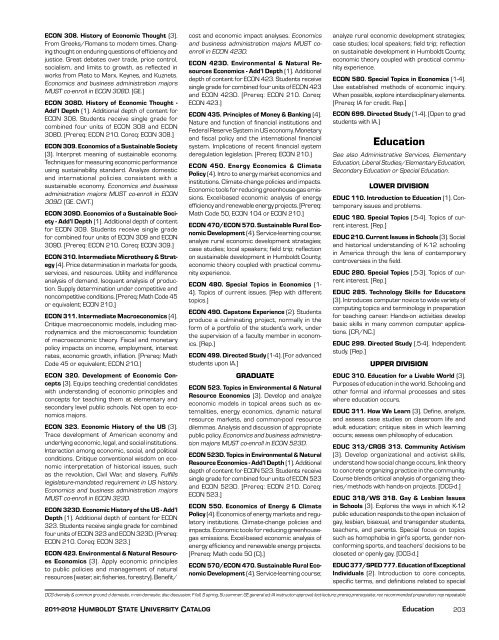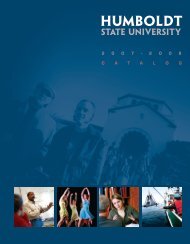2011-12 Academic Year - Bad Request - Humboldt State University
2011-12 Academic Year - Bad Request - Humboldt State University
2011-12 Academic Year - Bad Request - Humboldt State University
You also want an ePaper? Increase the reach of your titles
YUMPU automatically turns print PDFs into web optimized ePapers that Google loves.
ECON 308. History of Economic Thought (3).<br />
From Greeks/Romans to modern times. Changing<br />
thought on enduring questions of efficiency and<br />
justice. Great debates over trade, price control,<br />
socialism, and limits to growth, as reflected in<br />
works from Plato to Marx, Keynes, and Kuznets.<br />
Economics and business administration majors<br />
MUST co-enroll in ECON 308D. [GE.]<br />
ECON 308D. History of Economic Thought -<br />
Add’l Depth (1). Additional depth of content for<br />
ECON 308. Students receive single grade for<br />
combined four units of ECON 308 and ECON<br />
308D. [Prereq: ECON 210. Coreq: ECON 308.]<br />
ECON 309. Economics of a Sustainable Society<br />
(3). Interpret meaning of sustainable economy.<br />
Techniques for measuring economic performance<br />
using sustainability standard. Analyze domestic<br />
and international policies consistent with a<br />
sustainable economy. Economics and business<br />
administration majors MUST co-enroll in ECON<br />
309D. [GE. CWT.]<br />
ECON 309D. Economics of a Sustainable Society<br />
- Add’l Depth (1). Additional depth of content<br />
for ECON 309. Students receive single grade<br />
for combined four units of ECON 309 and ECON<br />
309D. [Prereq: ECON 210. Coreq: ECON 309.]<br />
ECON 310. Intermediate Microtheory & Strategy<br />
(4). Price determination in markets for goods,<br />
services, and resources. Utility and indifference<br />
analysis of demand. Isoquant analysis of production.<br />
Supply determination under competitive and<br />
noncompetitive conditions. [Prereq: Math Code 45<br />
or equivalent; ECON 210.]<br />
ECON 311. Intermediate Macroeconomics (4).<br />
Critique macroeconomic models, including macrodynamics<br />
and the microeconomic foundation<br />
of macroeconomic theory. Fiscal and monetary<br />
policy impacts on income, employment, inter est<br />
rates, economic growth, inflation. [Prereq: Math<br />
Code 45 or equivalent; ECON 210.]<br />
ECON 320. Development of Economic Concepts<br />
(3). Equips teaching credential can di dates<br />
with understanding of eco nomic princi ples and<br />
concepts for teaching them at ele mentary and<br />
sec ond ary level public schools. Not open to econom<br />
ics majors.<br />
ECON 323. Economic History of the US (3).<br />
Trace development of American econ o my and<br />
underlying economic, legal, and social institutions.<br />
Interaction among eco nomic, social, and political<br />
conditions. Critique conventional wisdom on econom<br />
ic in ter pretation of historical issues, such<br />
as the revolution, Civil War, and slavery. Fulfills<br />
legis lature-mandated requirement in US history.<br />
Economics and business administration majors<br />
MUST co-enroll in ECON 323D.<br />
ECON 323D. Economic History of the US - Add’l<br />
Depth (1). Additional depth of content for ECON<br />
323. Students receive single grade for combined<br />
four units of ECON 323 and ECON 323D. [Prereq:<br />
ECON 210. Coreq: ECON 323.]<br />
ECON 423. Environmental & Nat ural Resources<br />
Economics (3). Apply economic principles<br />
to public policies and man age ment of nat ural<br />
resources ( water, air, fisheries, forestry). Benefit/<br />
DCG diversity & common ground; d domestic, n non-domestic; disc discussion; F fall, S spring, Su summer; GE general ed; IA instructor approval; lect lecture; prereq prerequisite; rec recommended preparation; rep repeatable<br />
<strong>2011</strong>-20<strong>12</strong> <strong>Humboldt</strong> <strong>State</strong> <strong>University</strong> Catalog<br />
cost and eco nomic impact an alyses. Economics<br />
and business administration majors MUST coenroll<br />
in ECON 423D.<br />
ECON 423D. Environmental & Nat ural Resources<br />
Economics - Add’l Depth (1). Additional<br />
depth of content for ECON 423. Students receive<br />
single grade for combined four units of ECON 423<br />
and ECON 423D. [Prereq: ECON 210. Coreq:<br />
ECON 423.]<br />
ECON 435. Principles of Money & Banking (4).<br />
Nature and function of financial in stitu tions and<br />
Federal Reserve System in US economy. Monetary<br />
and fiscal policy and the international financial<br />
system. Implica tions of recent financial system<br />
deregulation legisla tion. [Pre req: ECON 210.]<br />
ECON 450. Energy Economics & Climate<br />
Policy (4). Intro to energy market economics and<br />
institutions. Climate-change policies and impacts.<br />
Economic tools for reducing greenhouse-gas emissions.<br />
Excel-based economic analysis of energy<br />
efficiency and renewable energy projects. [Prereq:<br />
Math Code 50, ECON 104 or ECON 210.]<br />
ECON 470/ECON 570. Sustainable Rural Economic<br />
Development (4). Service-learning course;<br />
analyze rural economic development strategies;<br />
case studies; local speakers; field trip; reflection<br />
on sustainable development in <strong>Humboldt</strong> County;<br />
economic theory coupled with practical community<br />
experience.<br />
ECON 480. Special Topics in Economics (1-<br />
4). Topics of current issues. [Rep with different<br />
topics.]<br />
ECON 490. Capstone Experience (2). Students<br />
produce a culminating project, normally in the<br />
form of a portfolio of the student’s work, under<br />
the supervision of a faculty member in economics.<br />
[Rep.]<br />
ECON 499. Directed Study (1-4). [For advanced<br />
students upon IA.]<br />
GRADUATE<br />
ECON 523. Topics in Environmental & Natural<br />
Resource Economics (3). Develop and analyze<br />
economic models in topical areas such as externalities,<br />
energy economics, dynamic natural<br />
resource markets, and common-pool resource<br />
dilemmas. Analysis and discussion of appropriate<br />
public policy. Economics and business administration<br />
majors MUST co-enroll in ECON 523D.<br />
ECON 523D. Topics in Environmental & Natural<br />
Resource Economics - Add’l Depth (1). Additional<br />
depth of content for ECON 523. Students receive<br />
single grade for combined four units of ECON 523<br />
and ECON 523D. [Prereq: ECON 210. Coreq:<br />
ECON 523.]<br />
ECON 550. Economics of Energy & Climate<br />
Policy (4). Economics of energy markets and regulatory<br />
institutions. Climate-change policies and<br />
impacts. Economic tools for reducing greenhousegas<br />
emissions. Excel-based economic analysis of<br />
energy efficiency and renewable energy projects.<br />
[Prereq: Math code 50 (C).]<br />
ECON 570/ECON 470. Sustainable Rural Economic<br />
Development (4). Service-learning course;<br />
analyze rural economic development strategies;<br />
case studies; local speakers; field trip; reflection<br />
on sustainable development in <strong>Humboldt</strong> County;<br />
economic theory coupled with practical community<br />
experience.<br />
ECON 580. Special Topics in Economics (1-4).<br />
Use established methods of economic inquiry.<br />
When possible, explore interdisciplinary ele ments.<br />
[Prereq: IA for credit. Rep.]<br />
ECON 699. Directed Study (1-4). [Open to grad<br />
students with IA.]<br />
Education<br />
See also Administrative Services, Elementary<br />
Education, Liberal Studies/Elementary Education,<br />
Secondary Education or Special Education.<br />
LOWER DIVISION<br />
EDUC 110. Introduction to Education (1). Contemporary<br />
issues and problems.<br />
EDUC 180. Special Topics (.5-4). Topics of current<br />
interest. [Rep.]<br />
EDUC 210. Current Issues in Schools (3). Social<br />
and historical understanding of K-<strong>12</strong> schooling<br />
in America through the lens of contemporary<br />
controversies in the field.<br />
EDUC 280. Special Topics (.5-3). Topics of current<br />
interest. [Rep.]<br />
EDUC 285. Technology Skills for Educators<br />
(3). Introduces computer novice to wide variety of<br />
computing topics and terminology in preparation<br />
for teaching career. Hands-on activities develop<br />
basic skills in many common computer applications.<br />
[CR/NC.]<br />
EDUC 299. Directed Study (.5-4). Independent<br />
study. [Rep.]<br />
UPPER DIVISION<br />
EDUC 310. Education for a Livable World (3).<br />
Purposes of education in the world. Schooling and<br />
other formal and informal processes and sites<br />
where education occurs.<br />
EDUC 311. How We Learn (3). Define, analyze,<br />
and assess case studies on classroom life and<br />
adult education; critique sites in which learning<br />
occurs; assess own philosophy of education.<br />
EDUC 313/CRGS 313. Community Activism<br />
(3). Develop organizational and activist skills,<br />
understand how social change occurs, link theory<br />
to concrete organizing practice in the community.<br />
Course blends critical analysis of organizing theories/methods<br />
with hands-on projects. [DCG-d.]<br />
EDUC 318/WS 318. Gay & Lesbian Issues<br />
in Schools (3). Explores the ways in which K-<strong>12</strong><br />
public education responds to the open inclusion of<br />
gay, lesbian, bisexual, and transgender students,<br />
teachers, and parents. Special focus on topics<br />
such as homophobia in girl’s sports, gender nonconforming<br />
sports, and teachers’ decisions to be<br />
closeted or openly gay. [DCG-d.]<br />
EDUC 377/SPED 777. Education of Exceptional<br />
Individuals (2). Introduction to core concepts,<br />
specific terms, and definitions related to special<br />
Education<br />
203

















